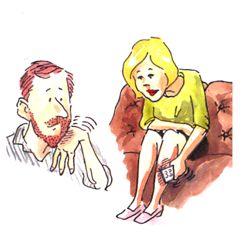Chronic eczema? Keeping short nails isn’t enough!

A colleague who I hadn't seen in a while stopped me outside the hospital and asked for advice about his little girl's troublesome eczema. He said it didn't seem that allergy was important, and he was hoping that there was a way I could help.
I suggested that the habit of scratching can be more important than allergy.
"Yes" he replied, " I thought of that too. I file her nails as short as can be."
When regular scratching is established and is obviously damaging the skin, cutting the nails short is the first thing that seems worth doing. Then perhaps artificial nails, cotton gloves, and "Tubigrip" bandages over the eczema, and other varieties on the protection theme - all seems sensible to try. Even physical restraint to mechanically stop scratching has been, and is still, used in extremis.
However, these measures may not be enough!
Habitual scratching has a persistent way of continuing. The power of habit needs to be realized: there is a craving, a powerful urge to attack the skin regardless. Even very short nails can damage the skin, and rubbing is just as "effective" as scratching. Rubbing skin on skin, or rubbing with cloth and clothes may be preferred "ways of scratching". Or perhaps using an instrument like a brush or comb, or rubbing against an object like a chair or table leg. The pictures above illustrate stories from our clinic. The man is using his designer stubble - designed for scratching. The edge of an antihistamine pack proved a good method for the lady.
Fortunately the behaviour modification technique habit reversal is easy to use and is very effective in tackling habitual scratching. However it does need a programmed approach, and it needs combining with optimized topical treatment. But then, after 5 or 6 weeks,The Combined Approach can replace months and years of troublesome eczema with a very marked improvement: no chronic eczema now, and less and less flare-ups.
A happy daughter, and a happy colleague.
Worth the effort!
